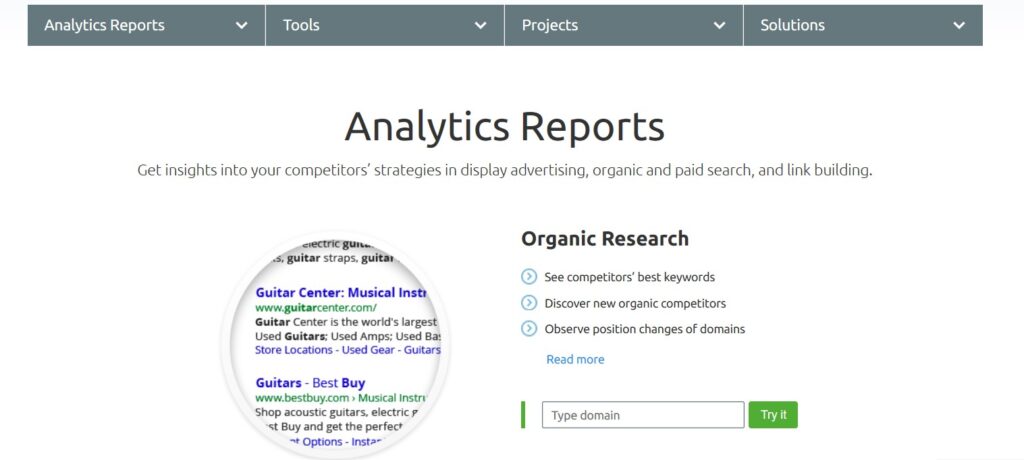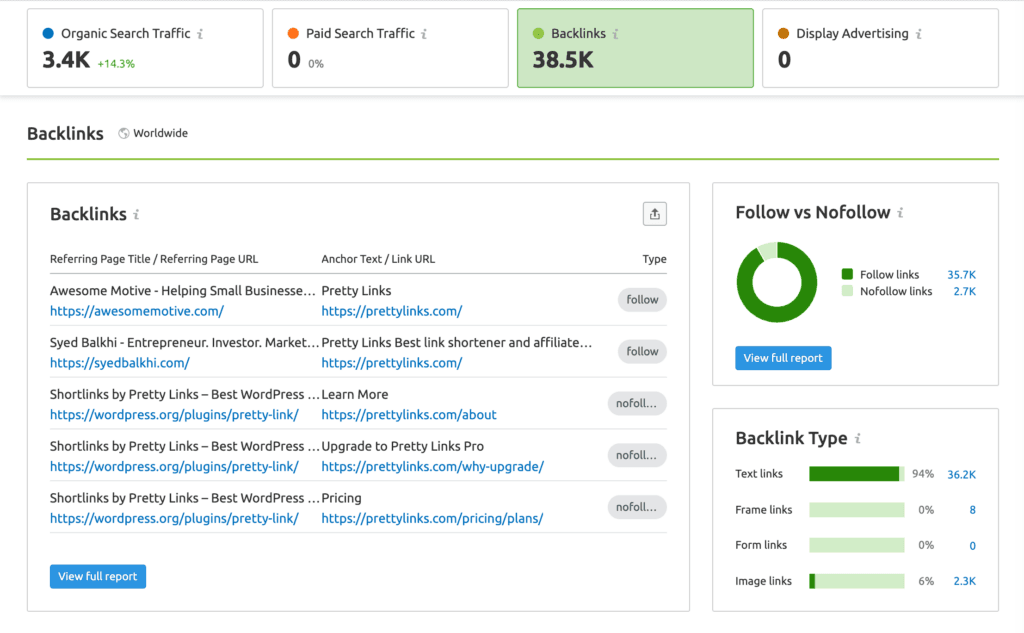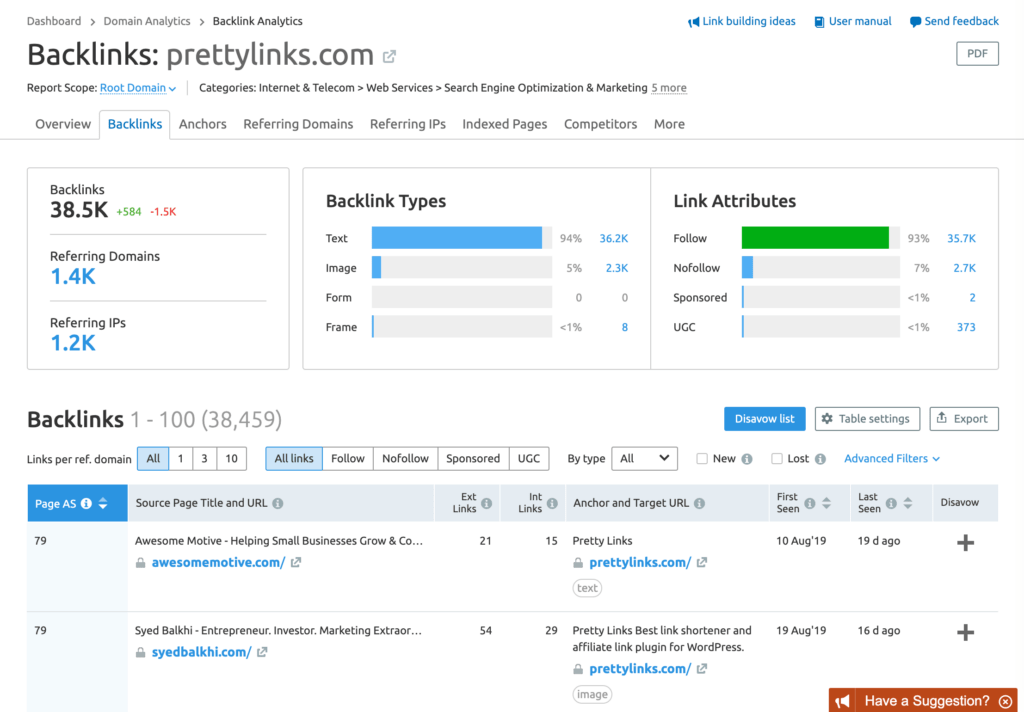Contenu

Il peut sembler difficile de trouver des opportunités de création de liens pour votre site web. Cependant, des liens de qualité sont importants car, sans eux, votre site web peut souffrir d'un mauvais classement dans les moteurs de recherche et d'un faible trafic.
C'est pourquoi la prospection de liens peut s'avérer précieuse. Il s'agit d'un moyen proactif de trouver des opportunités de création de liens en utilisant des outils de recherche en ligne et des moteurs de recherche tels que Google. Bien que cela puisse paraître fastidieux, cette méthode peut vous offrir d'excellentes options pour améliorer la visibilité de votre site.
Dans cet article, nous expliquerons tout d'abord ce que signifie la prospection de liens. Ensuite, nous vous donnerons quelques conseils pour commencer. Allons-y !
Introduction à la prospection de liens
L'objectif de la prospection de liens est de découvrir de nouvelles voies réputées susceptibles d'aboutir à des liens retour pour votre contenu. Cela peut créer de nouveaux chemins vers votre site, améliorer votre classement dans les moteurs de recherche et augmenter votre trafic.
Bien que vous puissiez adopter une approche plus passive, vous n'obtiendrez probablement que quelques liens vers votre site de cette manière. Il peut donc être avantageux de prendre l'initiative de la prospection de liens et de mettre la balle dans votre camp.
La création de liens est une étape importante pour élargir votre champ d'action, augmenter le trafic organique entrant et développer des relations solides avec d'autres acteurs de votre secteur d'activité. En regardant au-delà des recherches de surface, vous pouvez trouver des opportunités de références naturelles à votre site qui indiqueront votre crédibilité à Google, améliorant ainsi votre classement.
L'objectif de la prospection de liens se résume à vous aider à trouver options pour les backlinks. Il peut s'agir d'articles d'invités, de commentaires sur vos produits ou services sur d'autres sites, d'annuaires ou même de forums.
Cependant, vous devez vous assurer que vous produisez backlinks de qualité. Cela signifie que tout forum ou annuaire que vous utilisez doit être digne de confiance. Dans le cas contraire, Google pourrait considérer vos efforts comme du spam, une tromperie intentionnelle ou une tentative d'acheter votre place dans les premiers résultats, ce qui pourrait nuire à votre optimisation pour les moteurs de recherche (SEO).
Comment utiliser la prospection de liens pour révéler de nouvelles opportunités pour votre site web (3 conseils clés)
Si l'interaction avec d'autres acteurs de votre secteur d'activité est un élément essentiel pour accroître la visibilité de votre site, vous devez d'abord savoir où chercher des liens de qualité. Examinons de plus près trois conseils clés pour vous aider à démarrer la prospection de liens.
1. Effectuer des recherches nuancées pour trouver des opportunités de création de liens
Les moteurs de recherche, en particulier Google, constituent un excellent point de départ pour la prospection de liens. Si vous savez comment effectuer des requêtes intentionnelles et stratégiques, ils peuvent vous fournir des tonnes d'opportunités pour des liens de retour de haute qualité.
Par exemple, si vous recherchez des sites qui encouragent les publication d'articles par des invitésvous pourriez utiliser des requêtes tels que "écrivez pour nous" et "contribuez à", combinés à des mots clés du secteur.
De même, vous pouvez trouver des annuaires ou des pages de ressources appropriés en effectuant des recherches nuancées. Gardez à l'esprit que la pertinence est importante pour l'algorithme de Google. Il est donc essentiel d'inclure dans vos requêtes des termes liés à votre créneau. Vous pouvez effectuer une recherche de mots-clés avant de se lancer dans la prospection de liens.
Une fois que vous avez identifié les candidats aux liens retour, vous devrez peut-être vous engager dans une démarche de sensibilisation. Si vous y parvenez, il vous suffira d'inclure votre site web dans un annuaire ou une page de ressources, ou de rédiger un article sur vos liens cibles.
N'oubliez pas qu'il y aura probablement de nombreuses options parmi lesquelles vous pourrez choisir, et qu'il vous faudra donc être sélectif au moment de prendre votre décision. quels sont les sites qui fonctionnent le mieux pour vous. En effet, il est prudent de se concentrer sur les plus fiables et les plus réputés, car ils sont plus susceptibles d'améliorer votre crédibilité et votre classement dans les moteurs de recherche.
2. Faites des recherches sur vos concurrents pour savoir d'où viennent leurs backlinks
Votre marque n'est certainement pas unique en son genre. Il y a probablement d'autres entreprises dans votre secteur qui ont réussi à se hisser dans les pages de résultats des moteurs de recherche (SERP) et qui sont actuellement plus performantes que la vôtre.
Une façon intelligente de tirer parti de leur succès est d'utiliser des outils en ligne pour rechercher les backlinks de vos concurrents. Cela peut vous donner une idée de l'origine de leur succès et vous donner des idées pour vos propres efforts de création de liens.
Il existe plusieurs sites web et applications qui peuvent vérifier vos concurrents et vous montrer d'où viennent leurs backlinks. Vous pouvez ensuite utiliser ces informations pour créer une liste de sites qui s'intéressent déjà à votre secteur d'activité et qui pourraient être plus enclins à créer un lien vers vous.
L'utilisation de ces outils est souvent simple. SEMrush est un site qui propose une analyse gratuite des mots-clés et des domaines :

Son Aperçu du domaine fournit des analyses détaillées, y compris des profils de liens retour. Pour l'utiliser, saisissez l'adresse web de l'un de vos concurrents. Dans le rapport qui en résulte, faites défiler vers le bas jusqu'à la section Backlinks section :

Vous pouvez obtenir plus de détails en cliquant sur l'icône Voir le rapport complet y compris une liste des domaines de référence :

C'est cette liste que vous voudrez utiliser pour la prospection de liens. Examinez-la à la recherche de sites susceptibles de vous offrir des possibilités de publication en tant qu'invité ou d'autres opportunités.
3. Restez actif dans les communautés en ligne pour créer des relations avec d'autres personnes dans votre domaine.
Un autre moyen de réussir la prospection de liens est de rester actif sur les médias sociaux et d'autres communautés en ligne. Il ne s'agit pas seulement des plateformes évidentes telles que Facebook ou Twitter, mais aussi des forums et des sections de commentaires des articles de blog.
Cela peut être un moyen de rester au courant des derniers développements dans votre secteur d'activité. Vous pouvez ainsi découvrir des blogs dont vous n'aviez pas connaissance auparavant et sur lesquels vous pouvez proposer des articles en tant qu'invité. De même, vous pourriez trouver des sites d'évaluation disposés à présenter les produits de votre marque en échange d'un échantillon gratuit ou d'une promotion mutuelle.
Il peut être tentant de poster des liens vers votre propre contenu dans les forums ou les commentaires. Cependant, cela est souvent perçu comme un comportement de spam. Les liens "naturels", c'est-à-dire ceux que vous incorporez organiquement dans vos articles après la publication d'un article, sont souvent perçus comme une forme de spam. les raccourcir et les marquer - sont généralement beaucoup plus précieux.
Toutefois, cela signifie que vous devrez probablement établir de solides relations de travail avec d'autres sites dans votre créneau. En apportant des réflexions utiles et pertinentes dans les sections de commentaires et des informations utiles dans les discussions de forum, vous pouvez établir des contacts avec le secteur tout en asseyant votre autorité dans votre domaine.
Conclusion
La prospection de liens est un processus, mais elle peut aussi être une solution pour obtenir les backlinks dont vous avez besoin pour votre site. En fin de compte, le classement de votre contenu dans les SERP et le volume de trafic qu'il reçoit sont des indicateurs clés de son succès. Vous ne pouvez pas vous permettre d'ignorer ce domaine.
Dans cet article, nous avons présenté trois pistes de prospection de liens que vous pouvez envisager :
- Effectuer des recherches nuancées pour trouver des opportunités de publication en tant qu'invité.
- Effectuer des recherches sur les backlinks de vos concurrents pour découvrir des sites de qualité dans votre secteur.
- Rester actif dans les communautés en ligne et établir des relations avec des sources potentielles de liens retour.
Avez-vous des questions sur la prospection de liens ? Posez-les dans la section des commentaires ci-dessous !


